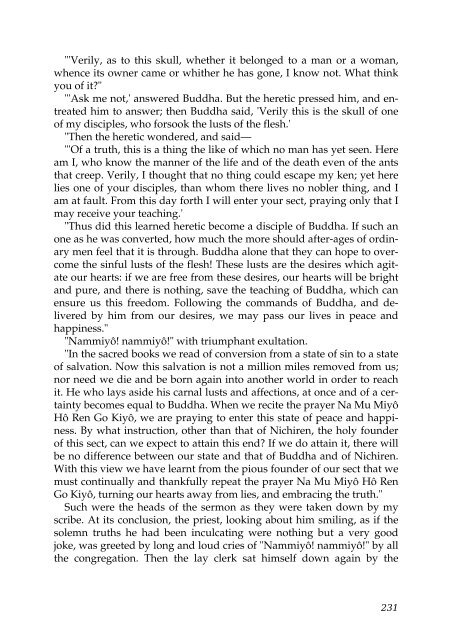Create successful ePaper yourself
Turn your PDF publications into a flip-book with our unique Google optimized e-Paper software.
"'Verily, as to this skull, whether it belonged to a man or a woman,<br />
whence its owner came or whither he has gone, I know not. What think<br />
you <strong>of</strong> it?"<br />
"'Ask me not,' answered Buddha. But the heretic pressed him, and entreated<br />
him to answer; then Buddha said, 'Verily this is the skull <strong>of</strong> one<br />
<strong>of</strong> my disciples, who forsook the lusts <strong>of</strong> the flesh.'<br />
"Then the heretic wondered, and said—<br />
"'Of a truth, this is a thing the like <strong>of</strong> which no man has yet seen. Here<br />
am I, who know the manner <strong>of</strong> the life and <strong>of</strong> the death even <strong>of</strong> the ants<br />
that creep. Verily, I thought that no thing could escape my ken; yet here<br />
lies one <strong>of</strong> your disciples, than whom there lives no nobler thing, and I<br />
am at fault. From this day forth I will enter your sect, praying only that I<br />
may receive your teaching.'<br />
"Thus did this learned heretic become a disciple <strong>of</strong> Buddha. If such an<br />
one as he was converted, how much the more should after-ages <strong>of</strong> ordinary<br />
men feel that it is through. Buddha alone that they can hope to overcome<br />
the sinful lusts <strong>of</strong> the flesh! These lusts are the desires which agitate<br />
our hearts: if we are free from these desires, our hearts will be bright<br />
and pure, and there is nothing, save the teaching <strong>of</strong> Buddha, which can<br />
ensure us this freedom. Following the commands <strong>of</strong> Buddha, and delivered<br />
by him from our desires, we may pass our lives in peace and<br />
happiness."<br />
"Nammiyô! nammiyô!" with triumphant exultation.<br />
"In the sacred books we read <strong>of</strong> conversion from a state <strong>of</strong> sin to a state<br />
<strong>of</strong> salvation. Now this salvation is not a million miles removed from us;<br />
nor need we die and be born again into another world in order to reach<br />
it. He who lays aside his carnal lusts and affections, at once and <strong>of</strong> a certainty<br />
becomes equal to Buddha. When we recite the prayer Na Mu Miyô<br />
Hô Ren Go Kiyô, we are praying to enter this state <strong>of</strong> peace and happiness.<br />
By what instruction, other than that <strong>of</strong> Nichiren, the holy founder<br />
<strong>of</strong> this sect, can we expect to attain this end? If we do attain it, there will<br />
be no difference between our state and that <strong>of</strong> Buddha and <strong>of</strong> Nichiren.<br />
With this view we have learnt from the pious founder <strong>of</strong> our sect that we<br />
must continually and thankfully repeat the prayer Na Mu Miyô Hô Ren<br />
Go Kiyô, turning our hearts away from lies, and embracing the truth."<br />
Such were the heads <strong>of</strong> the sermon as they were taken down by my<br />
scribe. At its conclusion, the priest, looking about him smiling, as if the<br />
solemn truths he had been inculcating were nothing but a very good<br />
joke, was greeted by long and loud cries <strong>of</strong> "Nammiyô! nammiyô!" by all<br />
the congregation. Then the lay clerk sat himself down again by the<br />
231



